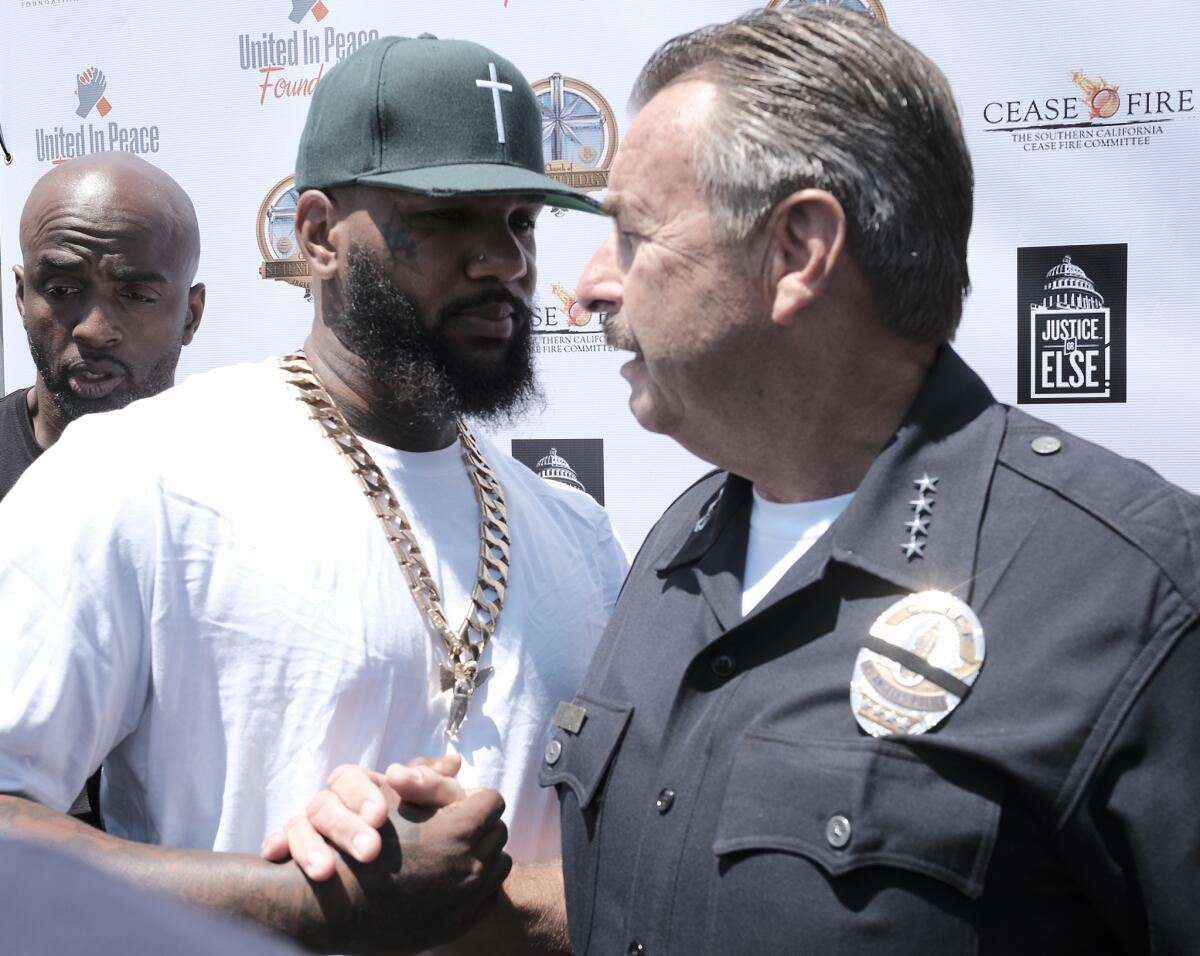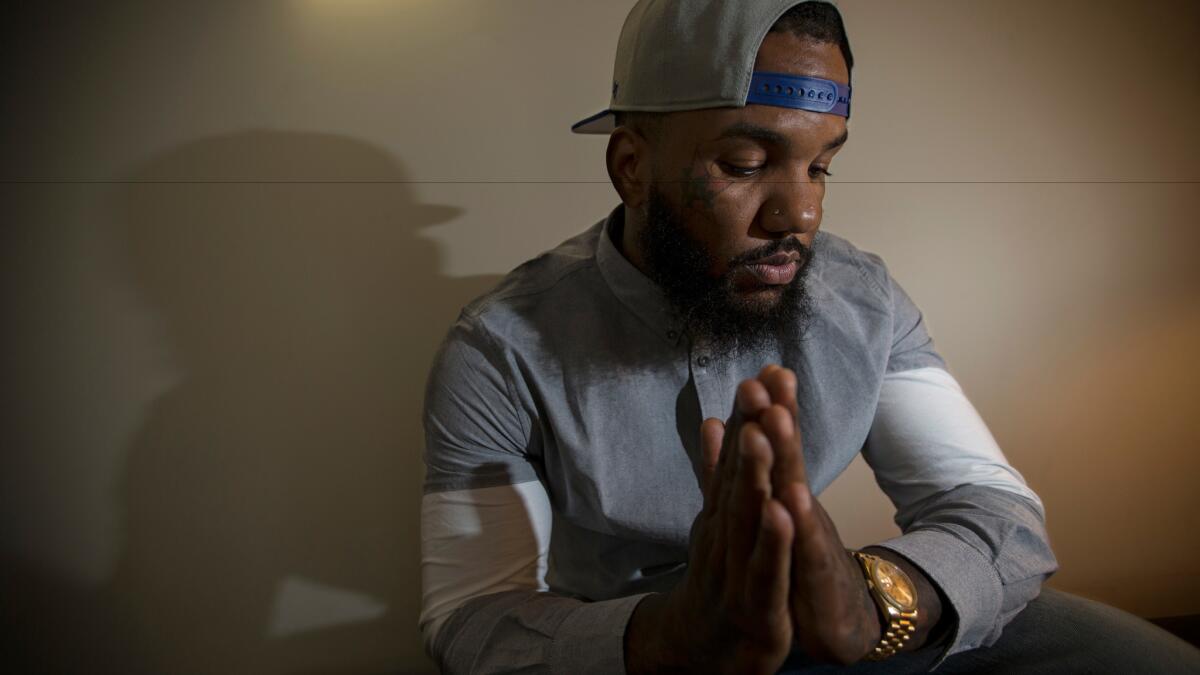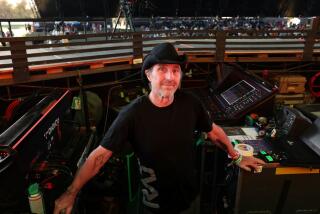The Game doesn’t care if he never sells another album - he’s out to make the world a safer place

Compton rapper The Game was once a latch-key kid weaned on the unofficial rap anthem of South Los Angeles, N.W.A’s “F— tha Police.”
“It was what we all knew in the ’hood, it was in our DNA,” he said.
Now 36 and a celebrity of sorts, The Game (a.k.a. Jayceon Taylor) has forged a successful career expressing such street ethos in top-selling albums.
So it came as a surprise last week when the heavily tattooed Taylor — an artist behind such songs as “Church for Thugs” — appeared in an LAPD-initiated public service announcement to stop the cycle of violence between minority communities and the police.

How we interact with each other during a normal traffic stop, the attitudes of law enforcement, how civilians act, can change the outcome.
— Jayceon Taylor
It followed a march days earlier led by Taylor to LAPD headquarters where he met with Police Chief Charlie Beck. Taylor, rap elder statesman Snoop Dogg and a group of 50 men were there to open a dialogue following the killing of black men by law enforcement across the country, and the subsequent targeting of Dallas police officers in a sniper incident.
“I’m not saying we’re all going to be best friends, but just how we interact with each other during a normal traffic stop, the attitudes of law enforcement, how civilians act, can change the outcome,” said Taylor from the set of the PSA in Hollywood.
Taylor is one of a handful of top-tier musicians who has taken action in the weeks following the deadly police shootings of Philando Castile in Minnesota, Alton Sterling in Louisiana and five officers killed by a sniper during an otherwise peaceful Black Lives Matter march in Dallas. Three more officers were later shot and killed in Baton Rouge, La.
Twitters postings aside, most music personalities have remained relatively silent during the heated debates on race relations and law enforcement that have dominated the national conversation. But since the killings in early July, a small group of popular artists are finally raising voices on the issues that have sparked major protests across the U.S.
Many of their messages are rooted in the Black Lives Matter movement, though, as Taylor attests, their approaches vary.
Rapper Jay Z and R&B singer Miguel recently released songs lamenting the deaths of unarmed black men at the hands of police, “Change does not come for the silent,” sings Miguel in “How Many.” “I’m tired of excuses for all the years’ injustices.”
Drake and Beyoncé — arguably the two biggest pop stars in the nation — have released statements onstage and online condemning the disproportionately high killings of black civilians by police.
“It’s impossible to ignore that the relationship between black and brown communities and law enforcement remains as strained as it was decades ago,” wrote Drake in a statement. “No one begins their life as a hashtag. Yet the trend of being reduced to one continues.”
R&B artist Alicia Keys enlisted two dozen celebrities for the filmed PSA “23 Ways You Could Be Killed If You Are Black in America.” Beyoncé, Rihanna, Common, Queen Latifah, Bono, Adam Levine, Pink and Pharrell Williams are among the music artists in the video who recite the circumstances — “Failing to signal a lane change,” or “Making eye contact” — while photos of the deceased, such as Sandra Bland and Freddie Gray, are shown. At the video’s close, viewers are urged to contact their representatives on Capitol Hill and demand action.
Taylor, who was formerly affiliated with a gang, has had his own run-ins with the law. It’s a past he feels makes him more qualified than most to act as a go-between in brokering peace.
“I’ve been body slammed on car hoods, been kicked in the face by police, I’ve had handcuffs so tight I felt like I couldn’t breath, I’ve been in jail,” he said.
“Sometimes it was my fault, sometimes it was for no reason. When you know you’re doing something wrong, of course, there’s consequences. But there’s also a process on how to police correctly and that has to be followed. As an adult I understand that. As a youth, I didn’t.”
If I never sell another rap album I’m still good with the person I am today.
— Jayceon Taylor
Raised in and out of foster care, Taylor grew up in 1980s and ’90s Compton during the rise of gangsta rap and the conditions that led to the ’92 riots.
“Walking to school meant walking through several different gang ’hoods, seeing people on corners with guns, smoking weed. There were police abusing their rights and disrespecting the badge. Seeing dead bodies in cars was just normal for me.”
Now the father of four children under the age of 14, the rapper is concerned about the country they’ll be inheriting. How will their safety be affected by the color of their skin?
He marched in Ferguson following the shooting of Michael Brown, and among his numerous tattoos is now an image of shooting victim Trayvon Martin.
More recently he helped organize a gang summit in South L.A. with Snoop Dogg, Chief Beck and other music artists such as Will I Am. The goal: to try to promote trust and avoid another national tragedy during a routine traffic stop or foot patrol.
Taylor has of course caught flak for colluding with the “enemy” (be it cops or various gang factions), and some fans wonder if his new efforts to heal might soften his hard-edged music.
“I can’t say the stories in my music are going to be nonviolent or I’m not going to speak on situations that render me helpless,” he said. “I’m just telling my story. But think about it, no one gets on Sylvester Stallone when he kills a jungle full of people in ‘Rambo.’ It’s entertainment and you got to understand it for what it is. There’s going to be violence, it’s part of my story.”
For every notable music artist like The Game who has spoken out, there are many more who’ve remained on the sidelines. To speak out is to risk alienating fans or sponsors.
“If I never sell another rap album I’m still good with the person I am today,” Taylor said. “I will know that my children’s lives, other kids’ lives and adult lives could be spared because there’s open dialogue between police and civilians going forward.
“If I can have a hand in that,” he says, “then I’m good.”
ALSO:
Kesha announces her first U.S. tour since starting a legal war with Dr. Luke
Queen doesn’t want the GOP to use ‘We Are the Champions,’ but is the law on their side?
DJ Q-Bert talks Invisibl Skratch Piklz reunion, Low End Theory Fest and the evolution of scratching
More to Read
The biggest entertainment stories
Get our big stories about Hollywood, film, television, music, arts, culture and more right in your inbox as soon as they publish.
You may occasionally receive promotional content from the Los Angeles Times.







